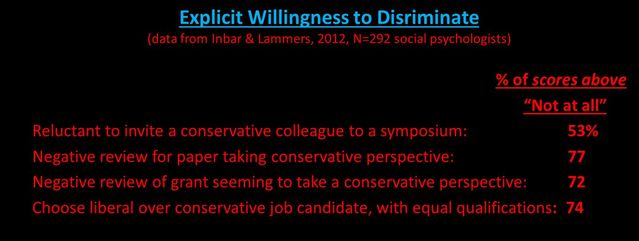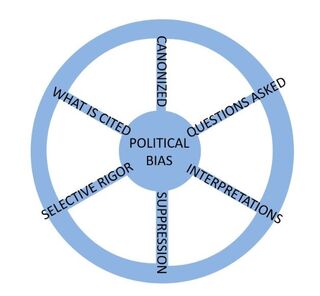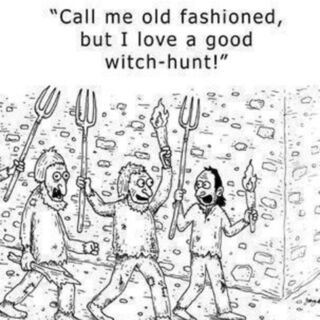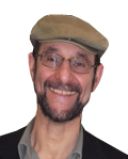Red flags have been raised by serious scholars about political biases undermining the validity and credibility of scientific research on politicized topics for a long time. In this essay, I review some of the key points made by numerous scholars over the decades.
The Skew
The makeup of psychology has drifted further and further left for a century, from about an even distribution of Democrats and Republicans to an almost complete absence of faculty who vote Republican now. For example, a survey found that, in 2012, 301 social psychologists reported voting for Obama and four for Romney.
This pattern is not restricted to psychology. One study found that, in social sciences and humanities, self-described "radicals," "activists," and "Marxists" outnumber conventional conservatives by about 10:1. These findings, which are so extreme they might seem to be delusions of rightwing conspiracy theorists, are thoroughly documented in the studies referenced below (under the heading By the Numbers).

This would not be a problem but for the potential, and, as I shall summarize below, the reality that that skew has undercut the validity of conclusions on politicized topics.
Academics Advocate Discrimination Against Conservatives

A slew of surveys of faculty across disciplines and across the Atlantic Ocean found that large percentages of liberal faculty endorse discriminating against their conservative colleagues (ranging from large minorities, if you go by "some" willingness to discriminate to huge majorities if you by any willingness to discriminate). The peer-reviewed publications reporting these results appear below in the section titled Endorsement of Discrimination against Rightwing Academics. Although the table shown above is only for social psychologists, similar patterns have been found across social science and humanities disciplines in California and among European philosophers.
In fairness, the few conservative faculty in these surveys expressed about as much willingness to discriminate against liberal faculty. However, a tiny minority (such as conservative faculty) rarely has the power to discriminate, whereas huge majorities typically have considerable power to do so. Also, just as many faculty justify hiring biases for women and minorities as necessary to redress current inequalities, it may be that conservative faculty may see favoring conservative faculty as necessary to preserve the academy's commitment to open-mindedness, perspective-taking, truth-seeking, and exposing students to a wide range of ideas.

The Big Picture
Nathan Honeycutt and I recently published a review and model of the way political biases operate in social psychology. This is captured in the figure shown to the left. It represents the idea that researcher politics can and do influence the questions they ask, how they interpret data, and which findings they choose to suppress and never publish. For example, this study re-examined 17 studies with large nationally representative samples. Together, they found no evidence of anti-Black bias among White respondents or the presence of anti-White bias among Black respondents, and most were never published.
"Selective rigor" refers to a tendency to hold research that contests certain types of leftist ideas to higher standards than research that advances leftist ideas. For example, this essay describes a slew of instances in which faculty were de-platformed, their papers retracted, or, in some cases, were fired. In most cases, the grounds offered included supposed scientific flaws (even though in most cases, the supposedly flawed work had been published in peer-reviewed journals and suffered no more—and sometimes fewer—flaws than other published work in those fields).
In many cases, papers are selectively cited in the service of advancing leftist narratives, such as pervasive bias against women in peer review and STEM. Similarly, our paper also suggested that political biases can and do influence what gets canonized in social psychology. "Canonization" refers to "conclusions widely accepted as true and which become famous and widely-repeated in textbooks and major reviews." Canonization is the research bottom line—it refers to what becomes accepted as truth, and, as such, is, in my view, more important than replication, statistics, or methods, all of which are simply stepping stones toward canonization. Certain ideas become canonized, not because there is strong and widely replicated evidence justifying them, but because they appeal to certain mythic narratives.
Concern about these issues within social psychology has risen to a sufficient level that dozens of social psychologists published an entire edited book with chapters addressing how political biases have led social psychologists to leap to conclusions about implicit bias and labor market gender discrimination, to develop poor measures of political constructs, and to discriminate against non-left graduate students and faculty (Crawford & Jussim, 2018).
Interestingly, the most powerful political biases may not even involve conventional politics (elections, parties, etc.). A recent review by Clark and Winegard (2020) brought together evidence from evolutionary, political, and social psychology and reached the conclusion that tribalism among academic social scientists (commitment to political identity groups) manifests mostly as equalitarianism: a sacred commitment to equality that brooks no explanation for inequality other than discrimination.
Although most of my Psychology Today posts predated their paper, many are consistent with their analysis, such as this, this, this, this, this, and this.

Punishment of Ideas That Contest Leftist Narratives
The most dangerous development of the last five years or so, in my view, is the rise of attempts to ostracize and punish academic heretics, events that are disturbing echoes of Soviet-, Mao-, McCarthy- and 1984-style denunciations. Academics are now at risk for being de-platformed, having their papers retracted, and even being fired for expressing ideas that trigger academic outrage mobs. The rise of denunciations and punishment for ideas raises reasonable concerns about what these people will do when they do gain control of institutions, and regarding their effects right now.
Intimidation tactics can prevent even the attempt at fair or objective tests of hypotheses, if such tests run the risk of producing data that does not support sacred narratives. Why risk incurring the wrath of outrage mobs and losing one's job? Many may conclude that it's better to not conduct research that might help resolve controversies or provide the "wrong" insights into the human condition.
References
References Organized by Political Bias Subtopic (with occasional comments)
Broad Overviews
Duarte, J. L., Crawford, J. T., Stern, C., Haidt, J., Jussim, L., & Tetlock, P. E. (2015). Political diversity will improve social psychological science. Behavioral and Brain Sciences, 38.
Jussim, L. (2012). Liberal privilege in academic psychology and the social sciences: Comment on Inbar and Lammers. Perspectives on Psychological Science, 7, 504-507.
Kaufmann, E. (2021). Academic freedom in crisis: Punishment, political discrimination, and self-censorship. Special report issued by The Center for the Study of Partisanship and Ideology, Essay here; full report here.
Maranto, R., Redding, R. E., & Hess, F. M. (2009). The politically correct university: Problems, scope and reforms. Washington, DC: The AEI Press. 16 chapters on everything from ideological distribution of professors in different fields to groupthink to solutions.
Martin, C. C. (2015). How ideology has hindered sociological insight. The American Sociologist, 47(1), 115–130. https://doi.org/10.1007/s12108-015-9263-z
Redding, R. E. (2001). Sociopolitical diversity in psychology: The case for pluralism. American Psychologist, 56(3), 205–215.
Tetlock, P. E. (1994). Political psychology or politicized psychology: Is the road to scientific hell paved with good moral intentions? Political Psychology, 15(3), 509–529. https://doi.org/10.2307/3791569. This is the article that launched addressing the problem of political biases in academia as topic itself worthy of serious academic scholarship.
Stanovich, K. (2021). The social science monoculture doubles down. Quillette.
By the Numbers: Massive Left Domination of the Academy
Abrams, S. Think professors are liberal? Try administrators. New York Times, October 16, 2018. https://www.nytimes.com/2018/10/16/opinion/liberal-college-administrators.html
Buss, D. M. & von Hippel, W. (2018). Psychological barriers to evolutionary psychology: Ideological bias and coalitional adaptations. Archives of Scientific Psychology, 148-158.
Duarte, J. L., Crawford, J. T., Stern, C., Haidt, J., Jussim, L., & Tetlock, P. E. (2015). Political diversity will improve social psychological science. Behavioral and Brain Sciences, 38.
Gross, N. & Simmons, S. (2014). The social and political views of American college and university professors. In N. Gross & S. Simmons (Eds), pp. 19-52, Professors and their politics. Baltimore, MD: Johns Hopkins University Press.
Inbar, Y., & Lammers, J. (2012). Political diversity in social and personality psychology. Perspectives on Psychological Science, 7(5), 496–503.
Langbert, M. (2018). Homogenous: The political affiliations of elite liberal arts college faculty. Academic Questions.
From the article:
“I find that D:R ratios among fifty-one of the top sixty-six U.S. News-ranked colleges average 10.4:1., Excluding Annapolis and West Point raises the ratio to 12.7:1. This compares with a national D:R ratio of 1.6:1 for people who have some graduate school experience.
Some STEM fields come close to the baseline national average of 1.6:1; potentially ideologically linked fields, especially the interdisciplinary studies fields, do not. Thus, the D:R ratio for engineering is 1.6:1 while for the interdisciplinary studies fields it is 108:0.”
Langbert, M. & Stevens, S. T. (2020). Partisan registration and contributions of faculty in flagship colleges.
SPSP Diversity and Climate Committee. (2019). SPSP diversity and climate survey. SPSP stands for The Society for Personality and Social Psychology. The survey is rich with information, but, among other things, surveyed its membership regarding various identities, including political ones. When compared to national data, it found that conservatives were more underrepresented than the other groups they surveyed.
Endorsement of Discrimination against Rightwing Academics
Honeycutt, N., & Freberg, L. (2017). The liberal and conservative experience across academic disciplines: An extension of Inbar and Lammers. Social Psychological and Personality Science, 8(2), 115–123. https://doi.org/10.1177/1948550616667617
Inbar, Y., & Lammers, J. (2012). Political diversity in social and personality psychology. Perspectives on Psychological Science, 7(5), 496–503.
Peters, U., Honeycutt, N., De Block, A., & Jussim, L (2019). Ideological diversity, hostility, and discrimination in philosophy. Philosophical Psychology, DOI: 10.1080/09515089.2020.1743257
How Political Biases Lead to Invalid Claims, and Misinterpreted and Misrepresented Findings in Academic Peer Reviewed Literature
Crawford, J.T. & L. Jussim (Eds.), 2018. Politics of Social Psychology. New York, NY: Psychology Press.
Jussim, L., Crawford, J. T., Anglin, S., & Stevens, S. (2015). Ideological bias in social psychological research. In J. Forgas, K. Fiedler, & W. Crano (Eds.), Sydney Symposium on Social Psychology and Politics. (pp. 91–109). New York, NY: Taylor & Francis.
Jussim, L., Crawford, J. T., Stevens, S., Anglin, S., & Duarte, J. L. (2016). Do high moral purposes undermine scientific integrity? In J. P. Forgas, Van Lange, & L. Jussim (Eds.), The Sydney Symposium on the Social Psychology of Morality. New York: Taylor & Francis.
Jussim, L., Crawford, J. T., Stevens, S. T., & Anglin, S. (2016). The politics of social psychological science: Distortions in the social psychology of intergroup relations. In P. Valdesolo & J. Graham (Eds.), Claremont Symposium on Social Psychology and Politics.
Jussim, L., Stevens, S. T., & Honeycutt, N. (2018). Unasked questions about stereotype accuracy. Archives of Scientific Psychology, 6(1), 214–229. http://dx.doi.org/10.1037/arc0000055
Reyna, C. (2018). Scale creation, use, and misuse: How politics undermines measurement. In J. T. Crawford & L. Jussim (Eds.), Politics of Social Psychology (pp. 81–98). New York, NY: Psychology Press.
von Hippel, W., Buss, D. M., Richardson, G. B. (2020). Science progresses through open disagreement: Rejoinder to Fine (2020). Archives of Scientific Psychology, 8m 11-14. This article intensively focuses on the political biases and distortions appearing in Fine’s book, Testosterone Rex, which, they show, refutes straw arguments never actually made in evolutionary psychology scholarship. They even quote Fine herself at several points that constitute blatant expressions of political agendas.
How the Academic Left Punishes Those it Views as Academic Heretics
Dreger, A. (2011). Darkness’s descent on the American Anthropological Association. Human Nature, 225-246. Fake news, before fake news was a thing. A journalist published a heavily faked “exposé” of supposed horrors committed by anthropologist Napoleon Chagnon, which never happened; but the exposé is accepted uncritically and without fact-checking by many anthropologists who then subject Chagnon to an academic inquisition.
Dreger, A. (2015). Galileo’s middle finger. New York: Penguin Books.
This book was early in raising red flag warnings about how transgender activists set out to destroy academic careers, something that seems to have accelerated in recent years.. It also retold the story of Napoleon Chagnon described above.
Jussim, L. (2018). The reality of the rise of an intolerant and radical left on campus. Areomagazine.
Jussim, L. (2020). The threat to academic freedom … from academics. https://medium.com/@leej12255/the-threat-to-academic-freedom-from-academics-4685b1705794




